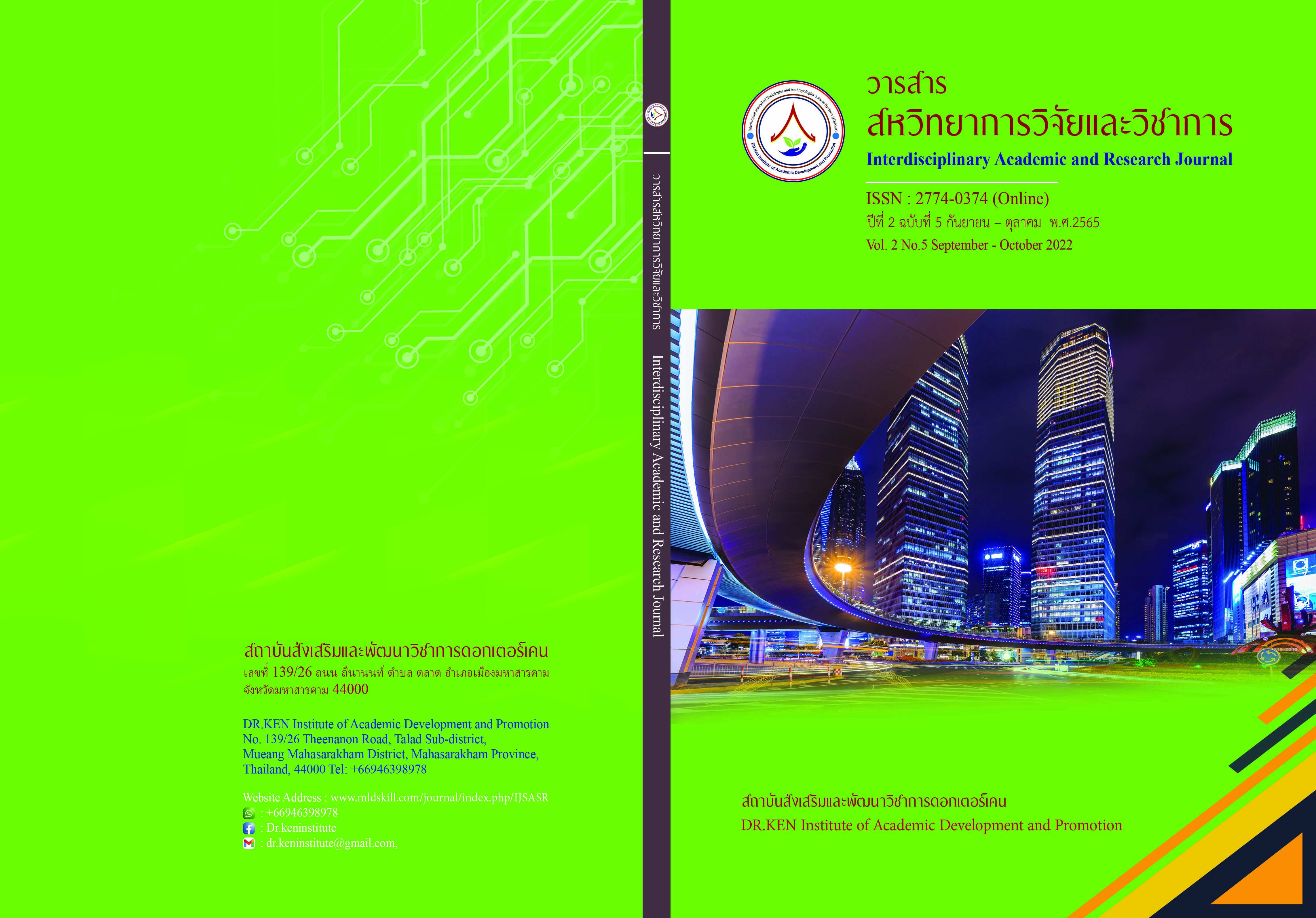Evaluation of the Project to Promote and Develop Learning Center According to the Sufficiency Economy Philosophy for Sustainability, Bannongbuasaadpokom School, Phibun Rak District, Udon Thani Province
DOI:
https://doi.org/10.14456/iarj.2022.103Keywords:
Project Evaluation; , Learning Center; , Philosophy of Sufficiency EconomyAbstract
The Sufficiency Economy Philosophy emphasizes developing people to be self-reliant to live without oppressing others and be happy as they are, know how to share, be generous, and be able to live together in society happily. Objectives of this project assessment To assess the project to promote and develop a learning center according to the Philosophy of Sufficiency Economy in education for sustainability, Bannongbuasaadpokom School, Phibun Rak District, Udon Thani Province. The sample groups used in this assessment were 5 teachers, 8 basic education committees, 64 students, and 64 parents, a total of 141 people. The tools used to collect data are questionnaires. The statistics used to analyze the data were percentage, mean, and standard deviation. The project evaluation results found that the evaluation of the project to promote and develop learning centers according to the philosophy of sufficiency economy in education for sustainability Overall, it was at a high level, with details as follows: (1) In terms of context, the overall level was at a high level. When sorted by average from descending, the top three are: the project objectives are clear, followed by the project's objectives to benefit, and the project is consistent with the parent's policy. (2) In terms of Input, overall, it’s at the highest level. When sorted by average from descending, the top three are: personnel have knowledge and understanding, followed by management who have awareness and readiness for project implementation and suitable project site. (3) In terms of process, overall, it’s at the highest level. When sorted in descending order of averages, they were 1) planning, 2) doing, 3) checking, and 4) action. A and (4) In terms of product, overall, it’s at the highest level. When sorted in descending, the top three are: there is a policy to apply the Sufficiency Economy Philosophy, followed by students having knowledge and teachers and educational personnel living following the Sufficiency Economy Philosophy. The opinions of students, overall, it’s at the highest level. When sorted in descending, the top three are: The students were happy, followed by the students with knowledge and understanding, and this project was beneficial to learning. The opinions of the parents of students, overall, it’s at a high level. When sorted in descending, the top three are: The project was beneficial to learning, followed by the value and benefit of the project and the students had diligent and economical behavior, eager to learn, and were responsible.
References
กระทรวงศึกษาธิการ. (2552). แนวทางการนิเทศเศรษฐกิจพอเพียงสู่สถานศึกษา. กรุงเทพฯ: สำนักงานปลัดกระทรวงศึกษาธิการ.
กระทรวงศึกษาธิการ. (2553). ผลการดำเนินงานขับเคลื่อนเศรษฐกิจพอเพียงสู่สถานศึกษา. กรุงเทพฯ: โรงพิมพ์คุรุสภาลาดพร้าว.
จรรยาพร ศิลาโชติ. (2561). การประเมินโครงการส่งเสริมและพัฒนาศูนย์การเรียนรู้ตามหลักปรัชญาของเศรษฐกิจพอเพียงสู่ความยั่งยืนของโรงเรียนบ้านเป้าวิทยา สังกัดองค์การบริหารส่วนจังหวัดชัยภูมิ. ชัยภูมิ : โรงเรียนบ้านเป้าวิทยา.
ชัยมงคล สิมมา. (2560). การประเมินโครงการเศรษฐกิจพอเพียงของโรงเรียนเมืองคง (คงคาวิทยา) สำนักงานเขตพื้นที่การศึกษาประถมศึกษาศรีสะเกษ เขต 2. ศรีสะเกษ: โรงเรียนเมืองคง (คงคาวิทยา).
ธนิตพงษ์ ฉวีพัฒน์. (2561). รายงานการประเมินโครงการเกษตรพอเพียงตามหลักปรัชญาของเศรษฐกิจพอเพียงโรงเรียนบ้านห้วยปอ. นครราชสีมา: โรงเรียนบ้านห้วยปอ.
นิภาพรรณ เจนสันติกุล. (2562). ปรัชญาเศรษฐกิจพอเพียง : การสำรวจงานวิจัยระหว่าง พ.ศ. 2549-2558. Southeast Bangkok Journal, 5 (1), 1-11.
พรทิพย์ ศรีจำเริญ. (2560). รายงานการประเมินโครงการเศรษฐกิจพอเพียง โรงเรียนสามบ่อวิทยา อำเภอระโนด จังหวัดสงขลา. สงขลา: โรงเรียนสามบ่อวิทยา.
พระครูพิมลกัลยาณธรรม และ พระมหามิตร ฐิตปัญโญ. (2562). ความพอเพียงกับวิถีสังคมไทย. วารสารวิชาการธรรมทรรศน์. 19 (4), 141-142.
มาเรียม นิลพันธ์. (2553). วิธีวิจัยทางการศึกษา (พิมพ์ครั้งที่ 5). นครปฐม: โรงพิมพ์มหาวิทยาลัยศิลปากร.
ยุพิน รอดประพันธ์. (2561). การประเมินโครงการโรงเรียนคุณธรรมโดยประยุกต์ใช้รูปแบบการประเมินซิป โรงเรียนวัดห้วยธารทหารสำนักงานเขตพื้นที่การศึกษาประถมศึกษานครสวรรค์ เขต 3. นครสวรรค์ : โรงเรียนวัดห้วยธารทหาร.
โรงเรียนบ้านหนองบัวสะอาดโพธิ์คำ. (2563). รายงานผลการประเมินตนเองของสถานศึกษา ปีการศึกษา 2563. อุดรธานี : โรงเรียนบ้านหนองบัวสะอาดโพธิ์คำ.
สำนักงานคณะกรรมการการศึกษาขั้นพื้นฐาน. (2562). นโยบายสำนักงานคณะกรรมการการศึกษาขั้นพื้นฐาน ปีงบประมาณ พ.ศ.2562. กรุงเทพฯ. สำนักงานคณะกรรมการการศึกษาขั้นพื้นฐาน กระทรวงศึกษาธิการ.
สุขสันต์ อิทธวิทยาวาทย์. (2559. ปรัชญาเศรษฐกิจพอเพียง : การศึกษาแนวคิด และการประยุกต์ใช้ในสังคมไทย.วารสารวิจัยและพัฒนา มหาวิทยาลัยราชภัฏเลย. 11 (38), 95-104.
เอมอร ศรีวรชิน. (2561). รายงานการประเมินโครงการส่งเสริมการเรียนรู้ตามหลักปรัชญาของเศรษฐกิจพอเพียง โรงเรียนทัพรั้งพิทยาคม. นครราชสีมา: โรงเรียนทัพรั้งพิทยาคม.
Stufflebeam and Shinkfield. (2007). Evaluation Theory, Models and Applications. John Wiley and Son, Inc.
Downloads
Published
How to Cite
Issue
Section
License
Copyright (c) 2022 ณภัสนันท์ สมพอง

This work is licensed under a Creative Commons Attribution-NonCommercial-NoDerivatives 4.0 International License.
Copyright on any article in the Interdisciplinary Academic and Research Journal is retained by the author(s) under the under the Creative Commons Attribution-NonCommercial-NoDerivatives 4.0 International License. Permission to use text, content, images, etc. of publication. Any user to read, download, copy, distribute, print, search, or link to the full texts of articles, crawl them for indexing, pass them as data to software, or use them for any other lawful purpose. But do not use it for commercial use or with the intent to benefit any business.
















.png)


